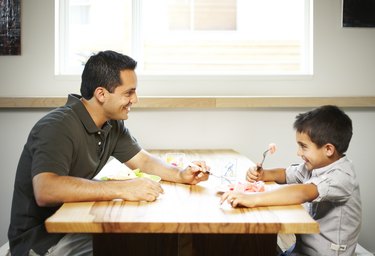
Worrying about your child's health is normal to some extent; all parents worry from time to time. In particular, the intimate details of a child's digestive system can be a source of concern for new parents who are not accustomed to the wide range of bowel habits that are considered normal. Understanding what to expect ensures that you to know when to worry about your child's bowel movements and when to sit back and relax.
Color
Video of the Day
Stool color varies widely, even in the same child, depending on the foods he has recently eaten. A baby's bowel movement can range in color from green to mustard-yellow to brown. By the time a child is eating solid foods, stool color is usually brown. Bowel movements that are dark and tarry or tinged with bright red may be cause for worry if your child has not eaten licorice, beets or red-colored fruit punch recently. As these colors can indicate bleeding in the gastrointestinal tract, the symptom should be discussed with your child's doctor.
Video of the Day
Consistency
Just as the color of your child's bowel movement varies, so does its consistency. Get to know the normal consistency, size and shape of your child's movements in order to determine if a change is really cause for concern. Stool that is very hard and dry or extremely runny or filled with mucus is not normal, and can indicate issues related to diet. Give your child more fiber and water to help make the passage of waste more comfortable, and cut back on dairy products and fatty foods to eliminate diarrhea. If your child is consistently constipated or has diarrhea for more than a few days, contact the pediatrician.
Frequency
The frequency of producing a bowel movement can be worrisome to parents when the child's bowel habits suddenly changes. Babies and toddlers often have several bowel movements daily; older children may go once a day or slightly less often. Constipation is defined by the American Academy of Family Physicians as producing less than three bowel movements weekly. Pediatrician Dr. William Sears defines moderate diarrhea as having between four and eight watery stools each day. Try not to worry about the frequency of your child's bowel movements unless she is acting sick in other ways, is not wetting diapers or urinating, or complains of stomach pain.
Other Symptoms
Your child may require medical attention if he displays other symptoms of illness in addition to a change in bowel habits. Dehydration can become a concern when bowel movements become watery and explosive. Seek medical care for your child if he is lethargic, has dry skin or sunken eyes, or can't keep fluids down while having diarrhea. Your child could be at risk for impaction -- a blockage of the intestines -- if the constipation becomes severe and he is not able to expel stool.
Is this an emergency? If you are experiencing serious medical symptoms, please see the National Library of Medicine’s list of signs you need emergency medical attention or call 911.